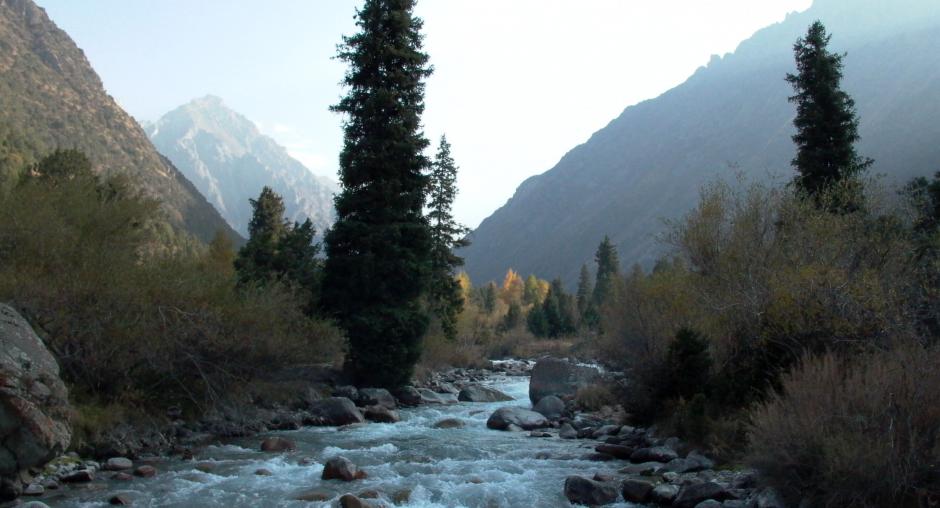Newsroom
Water as a security issue - OSCE Secretary General encourages co-operation in message to Tajikistan forum
DUSHANBE 29 August 2003

(OSCE/Lubomir Kotek)The Tien Shan mountain range in Kyrgyzstan is one of Central Asia's most important water sources. (OSCE/Lubomir Kotek) Photo details
DUSHANBE, 29 August 2003 - OSCE participant States are maintaining a close watch on the potential for insecurity posed by competition over water resources, the Secretary General of the OSCE, Jan Kubis, will tomorrow inform an international conference in Tajikistan.
In a message to the Dushanbe International Fresh Water Forum, read on his behalf by the OSCE's Head of Centre, Yves Bargain, Mr Kubis will say that water resources - their scarcity, distribution and quality aspects - have been recognized as a potential factor that can lead to political pressures.
"History shows, however, that water is more likely to trigger co-operation than conflict."
He will tell the more than 400 participants - representing international organizations, governments and NGOs from over 50 countries - that: "Water is a primary issue of concern for the OSCE. Its 55 participating States selected water management as a topic of the 2002 OSCE Economic Forum and since then it has occupied a prominent place on the agenda."
Through the Office of its Co-ordinator for Economic and Environmental Activities, Mr. Kubis will point out that the OSCE is directly engaged in a number of projects that aim at promoting dialogue and co-operation on sustainable water management.
"The implementation of these projects will also contribute to enhancing early warning and conflict prevention mechanisms and strengthen processes of confidence-building and co-operation throughout the OSCE area."
Among the other points in his speech to the Dushanbe Forum, initiated by the Government of Tajikistan, the Secretary General will emphasize that:
On the margins of the Fresh Water Forum, three bodies - the OSCE, the United Nations Development Programme (UNDP) and the United Nations Environmental Program (UNEP) - have organized a joint side-event to present the joint OSCE/UNDP/UNEP Initiative on Environment and Security (ENVSEC).
In a message to the Dushanbe International Fresh Water Forum, read on his behalf by the OSCE's Head of Centre, Yves Bargain, Mr Kubis will say that water resources - their scarcity, distribution and quality aspects - have been recognized as a potential factor that can lead to political pressures.
"History shows, however, that water is more likely to trigger co-operation than conflict."
He will tell the more than 400 participants - representing international organizations, governments and NGOs from over 50 countries - that: "Water is a primary issue of concern for the OSCE. Its 55 participating States selected water management as a topic of the 2002 OSCE Economic Forum and since then it has occupied a prominent place on the agenda."
Through the Office of its Co-ordinator for Economic and Environmental Activities, Mr. Kubis will point out that the OSCE is directly engaged in a number of projects that aim at promoting dialogue and co-operation on sustainable water management.
"The implementation of these projects will also contribute to enhancing early warning and conflict prevention mechanisms and strengthen processes of confidence-building and co-operation throughout the OSCE area."
Among the other points in his speech to the Dushanbe Forum, initiated by the Government of Tajikistan, the Secretary General will emphasize that:
- the issues discussed at the 2002 Economic Forum taught a number of lessons with regard to co-operation on water, including the fact that effective institutions, such as river basin commissions, are of great importance and they need to be capable of absorbing both political and environmental changes.
- water has to be seen in the political context of international relations, since water management which does not take this into consideration has limited chances of achieving sustainable results.
On the margins of the Fresh Water Forum, three bodies - the OSCE, the United Nations Development Programme (UNDP) and the United Nations Environmental Program (UNEP) - have organized a joint side-event to present the joint OSCE/UNDP/UNEP Initiative on Environment and Security (ENVSEC).
